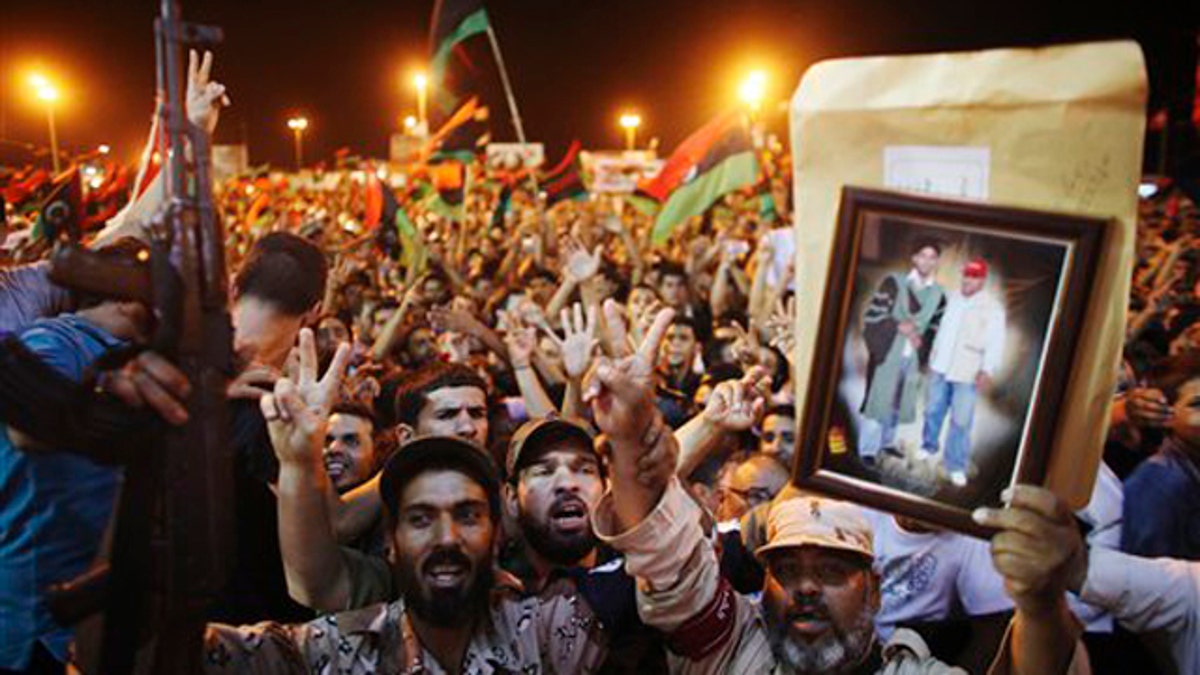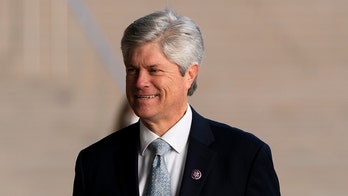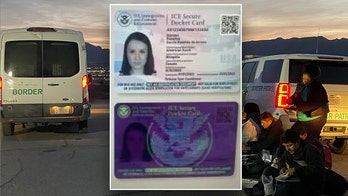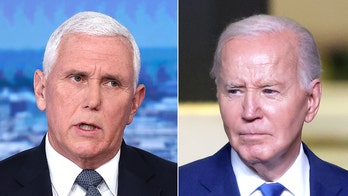
Monday: People celebrate the capture in Tripoli of Muammar al-Qaddafi's son and one-time heir apparent, Seif al-Islam, at the rebel-held town of Benghazi, Libya. The celebration was premature, however, as Seif al-Islam appeared in Tripoli Monday night to corral regime supporters. (AP)
With another Arab country on the cusp of deposing its leader, U.S. and European leaders are greeting the looming regime change in Libya with a mix of triumph and trepidation.
The Obama administration and its allies surely will cast the rebels' swift and decisive advance into Tripoli over the weekend as a vindication of their protracted intervention in a de facto civil war. Just last month, some lawmakers in Congress were trying to yank funding for the mission.
The president is expected to speak about the developments in Libya at 2 p.m. ET on Monday.
But analysts, and President Obama himself, warned that the hard work is not finished. Effectively, nobody is in charge of the country. Muammar al-Qaddafi is missing, his sons have been captured and the rebels are still pushing through pockets of Tripoli without a plan for who is the right person to take the reins of leadership.
The presumed transition, as in Egypt, raises questions about whether the government that replaces Qaddafi's will be pro-American or anti-American, Islamist or secular or somewhere in-between.
"Weeks from now, we're going to see the beginning of a tension between the more Islamist part and the more secular part of that Transitional Council," said Walid Phares, a Middle East analyst and Fox News contributor.
The latest revolution of the Arab Spring also may not be its last. Retired Gen. Jack Keane, former vice chief of staff for the Army, said the Tripoli offensive "provides energy" for protesters in Syria.
It comes after Obama and European allies increased pressure on Syria's Bashar Assad with sanctions and long-awaited calls for him to step down following months of assaults on protesters. The mounting changes in turn increase pressure on Obama to express a more detailed and comprehensive approach to the political change in the Middle East and North Africa, to impart some measure of stability on a region that has little.
"He does need a plan," said Tevi Troy, senior fellow with the Hudson Institute.
In the near-term, the NATO-led coalition in Libya will be focused on keeping the situation from spiraling out of control.
Keane said the most important order of business will be to maintain security in the absence of a stable government.
"Civil order is crucial," he told Fox News, saying a spree of looting and revenge-killing would be disastrous to the budding transition.
U.S. officials said part of that effort will be to ensure that Libya's arsenal of weapons -- including its anti-aircraft missiles and chemical weapons -- are secured and kept from falling into the wrong hands. House Intelligence Committee Chairman Rep. Mike Rogers, R-Mich., said the United States must "step up and lead to ensure U.S. national security interests are safeguarded."
"In particular, we must ensure that Qaddafi's stockpiles of advanced weapons, chemical weapons and explosives don't fall into the wrong hands," he said in a statement.
Offering a glimpse into where western officials will be focused in the coming days and weeks, British Prime Minister David Cameron said Monday that his government will be working on deploying medical supplies and maintaining or repairing basic infrastructure in the country. He also said the U.N. Security Council will consider giving the Libyan rebels the "legal, diplomatic, political and financial support they need."
Obama, in a written statement, urged the Transitional National Council to show "leadership" in a way that respects the rights of Libyans. Recognizing the council as the country's official government, Obama urged its leaders to avoid civilian casualties and pursue "democracy that is just and inclusive for all of the people of Libya."
"A season of conflict must lead to one of peace," Obama said in a written statement issued from his vacation digs at Martha's Vineyard. "We will continue to insist that the basic rights of the Libyan people are respected. And we will continue to work with our allies and partners in the international community to protect the people of Libya, and to support a peaceful transition to democracy."
The perils of regime change were exemplified last week during a deadly dispute between Egypt and Israel. After Palestinian militants launched a series of attacks in a resort area of southern Israel, presumably entering by way of Egypt, Israeli forces in pursuit of the militants apparently killed three Egyptian soldiers.
The Israelis labeled it an accident, but the violence prompted fierce anti-Israel protests in Cairo and condemnation from Egypt's new government. Both sides are trying to defuse the tension as Palestinian militants say they will continue to target Israel.
Regardless of the potential for future unrest in the region, U.S. officials described the weekend's developments in Libya as unquestionably positive.
"We've seen difficulties with other countries that have made this transition, but we will be rid of a guy who has the blood of Americans on his hands," Sen. John McCain, R-Ariz., told CBS' "Face the Nation."
Obama said Tripoli was "slipping from the grasp of a tyrant."
The chairman of the Libyan opposition said Monday that the "real moment of victory" will come when Qaddafi is captured. He vowed that the transitional council wants to give him a fair trial.
Qaddafi's whereabouts are still unknown.
Despite the celebration Monday, Keane said western policies "protracted" the war. While the Obama administration for months has defended its slow-and-steady approach to Libya, Keane described the entire operation as a "tongue-in-cheek mission" -- one which described itself as humanitarian but sought the ouster of Qaddafi.
"The problem is we never used decisive force to do that," he said.




